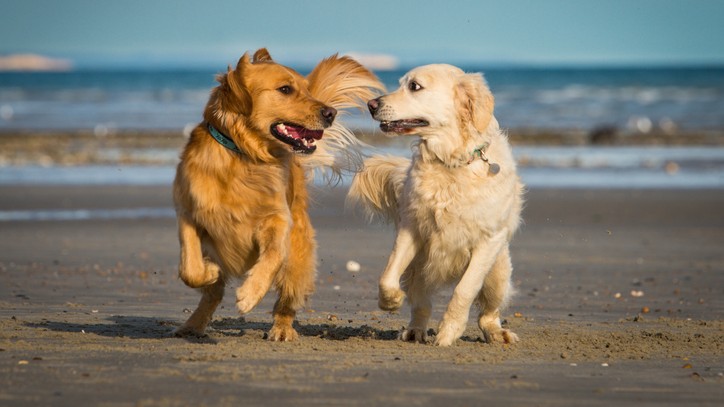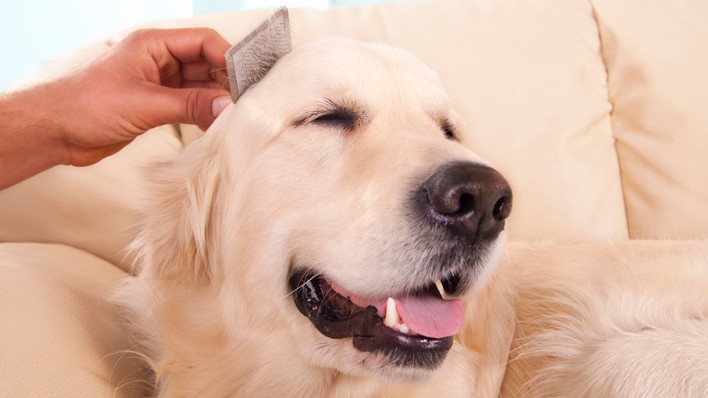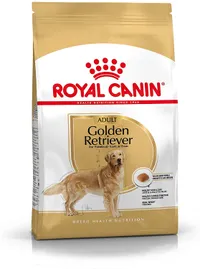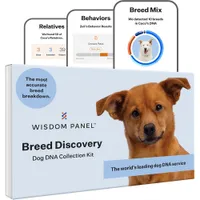Golden Retriever: Breed profile
Loving, gentle, intelligent and very active. Find out why the Golden Retriever is such a popular family dog

Get the best advice, tips and top tech for your beloved Pets
You are now subscribed
Your newsletter sign-up was successful
The Golden Retriever is sociable, intelligent, and devoted, and these medium sized dogs are a hugely popular choice for family pets. They make friends with everyone – even intruders to your property! – and are responsive to being trained. Their outgoing, trustworthy, and eager-to-please nature means they are often used as guide dogs and in search-and-rescue teams. This type of retriever is also naturally athletic and do well in dog sports such as agility and competitive obedience. As such, they need a lot of dog exercise and entertainment to prevent them getting restless and bored.
They are a larger breed of dog that lives for 10–13 years. Male golden retrievers grow to 58–62cm tall and weigh about 60–80 pounds (27–36 kg). Females grow to 53–55cm tall and weigh about 55–70 pounds (25–32 kg). They have an attractive thick water-repellent coat that is wavy or flat and gold to cream in color, but they are one of the breeds that sheds the most! They are strong dogs that aren't always aware of their size, so will happily jump into your lap even when full grown, and their thick wagging tail can be a menace to precious ornaments.
According to the prevailing theory, golden retrievers have been around since 1868 and were created by dog breeder Dudley Coutts Marjoribanks. The story goes he met a cobbler with a wavy-haired retriever with gold-colored fur. At the time this was rare, as the fashion for the best hunting dog breeds was that they should be black. He acquired the dog and bred it with a Tweed spaniel, a breed that is now extinct.
By crossing a water spaniel with a gun dog, he created an attractive dog capable of being a robust hunter in both water and land to help with hunting grouse, partridge and even red deer. The first litter produced by this cross created the first golden retrievers which he named Cowslip, Crocus and Primrose, and he passed on his new breed only to family and friends. Their use as hunting dogs and cheerful personality caught on and now they are the US's third most popular dog to own.
Life expectancy: 10-12 years
Average weight: Male: 60 to 80 pounds (27 to 36 kg) Female: 55 to 70 pounds (25 to 32 kg)
About the same as: 10 laptops
How much exercise does a Golden Retriever need?
Golden Retrievers originated as hunting dogs, so they have boundless energy that they need to expend to prevent them from becoming bored and destructive. They need more than a big back yard to play in, and need exercising at least twice a day for a total of two hours.
As a sporting breed, they are designed to travel large distances and be able to do physically demanding work, so this is a serious consideration when choosing this type of dog. If they don't get the exercise they need then they will vent their pent-up energy in other ways – by digging up your garden or chewing on your shoes and furniture, for instance.
Golden Retrievers are perfect for sporty types and keen ramblers. They can be easily trained to run alongside a bike or when you are out for a run. They tend to love water, so really enjoy walks by streams, lakes, or at the beach. They are also natural retrievers, so fetch will never get boring! If you are an active person who loves to get out, you will always have a four-legged friend to accompany you if you add a Golden retriever to your home.
Get the best advice, tips and top tech for your beloved Pets
Suitable for: Popular cheerful family pet, with a very friendly temperament, for people who enjoy exercise.
Not suitable for: Not for those who don't like dog hair or odors. And not suitable as a guard dog.
Temperament: A friendly and active dog with an incredibly easy-going nature
Shedding: Heavy
Training and obedience
As a smart loyal dog breed, Golden Retrievers can be trained reasonably easily, but they are not, as some people will tell you 'born that way'. It takes patience, and training must be done in an environment with no distractions as they have a short attention span. On the plus side, it is in their nature to be obedient, they love being given tasks and they look to please their owners, so once successfully trained you will have a very obedient dog. Obedience, coupled with their friendly natures, helps make them one of the best therapy dog breeds.
In fact, in the 2018 American Kennel Club National Obedience Championship, the winner was Streak, a Golden Retriever. For best results training and socializing with others needs to start young, ideally while still a puppy, and be done consistently. Their intelligence makes them mischievous, so establishing a training relationship early and on a regular basis to create a strong bond between you and your dog is essential.
Without training there are a few traits to watch out for. As well as their natural inquisitiveness and tendency to get bored if left alone for too long or not exercised properly, Golden Retrievers tend to get overly excited following scents. They can easily wander off if they are following an entertaining trail, totally oblivious to everything else.
This means keeping them on a leash is essential before they are trained to stay by your side or come when called. They are also not a good dog to guard your property; they are more likely to make friends with burglars than chase them off. If you're looking for an obedient guard dog, consider a German Shepherd.
Food and nutrition
If there is one thing dog breeders and trainers agree on, it's that Golden Retrievers love food, whether it’s the best dog food or not! They will eat anything and everything! However, that doesn't mean that you should let them, as their greedy nature means they are prone to obesity.
To deal with their voracious appetite, you need to keep them to strict regular meals and avoid letting them eat from the table or giving them too many dog treats. It's also essential you keep your bins secure! On average, a Golden Retriever should be fed between 2 and 3 ½ cups of food per day depending on how much exercise they've had.
Kibble is better than wet dog food, as they love chewing. The food you provide should be species-appropriate with a balanced proportion of calories, minerals, trace elements and vitamins to help reduce potential health issues and keep a glossy coat.
Royal Canin Golden Retriever Adult Dry Food | Amazon
This dog food formula is designed for Golden Retrievers over 15 months (younger dog owners should look at Royal Canin Breed Health Nutrition Golden Retriever Dry Puppy Food). It ensures they have the right mix of nutrients balanced to help maintain ideal weight. It's also enriched with taurine, EPA and DHA for healthy cardiac function.
Temperament
Golden Retrievers are some of the friendliest dogs you will come across. They love being part of a family and are one of the best family dogs, and are incredibly sociable, so don't do well in an outside kennel or yard.
If you have a family then Golden Retrievers are great with children. Their non-aggressive and playful nature means they can put up with the demands of younger family members – but they are a larger breed, and don't know their own size, so may knock over small children accidentally. Their amiable nature means they rarely bark, and don't have good guarding instincts, but if you are looking for a loyal best friend and loving family member, this is the dog for you.

Grooming
Amount Of Shedding: High
Easy To Groom: Yes
General Health: Prone to some diseases
Potential For Weight Gain: High
If you get a Golden Retriever, you are going to have to accept dog hair in your life. They shed profusely and even with regular brushing using the best dog brushes you are going to need to invest in some heavy-duty lint rollers if you want to keep their fur off your clothes and furniture. Heaviest shedding occurs in the spring and fall, but you can expect some shedding all year round. This dog is not suitable for shaving, so you will need to plan for a daily brushing routine.
Grooming at home however will not be a problem. Unlike other breeds, Golden Retrievers love being groomed so you will find little resistance there, and these sessions can become a good way for you to bond with your dog. Bathing will also help keep dog hair and odors down. Note that Golden Retrievers are prone to waxy ears, as their long floppy ears reduce air circulation, so after a dip in the bath you need to ensure you dry them thoroughly.
Wisdom Panel Breed Discovery DNA Kit | Amazon
Not sure exactly what breed your dog is? This kit screens for 365+ breeds – because knowing every detail about your dog helps you understand how best to care for them.
Health
When it comes to health, this is something you need to consider carefully as you are likely to have problems with your Golden Retriever as your dog ages. The Kennel Club classes the Golden Retriever breed as category 2, as in having particular points of concern for the breed.
Golden Retrievers are prone to certain conditions which could cause upset and large vet bills in the future, but as with all health issues, vigilance can help nip these problems in the bud.
Elbow and hip dysplasia are common in Golden Retrievers – this is where the joints don't fit together perfectly which over time can lead to arthritis. They also can suffer from various eye issues such as glaucoma, degenerative blindness and cataracts, so it is advisable to budget for yearly eye screenings.
The highest cause of death in Golden Retrievers is cancer, and they are more susceptible to it than other breeds. The Golden Retriever Club of America [https://grca.org/] puts the cancer rate of Golden Retrievers as approximately 60% (By gender, it’s 57% of females and 66% of males). Again, regular vet visits will help detect signs of cancer early so it can be treated.
Their greedy nature means they are also prone to obesity, but provided you exercise them well and can keep them on a sensible diet, this can be avoided. It just means no giving into those soulful eyes as they watch you eat at the dinner table.
Should I get a Golden Retriever?
As long as you are willing to exercise them and keep them stimulated, Golden Retrievers are a good fit for families or single people in any size home, as long as you don't mind a strong wagging tail knocking over your belongings and them shedding fur all over your clothes and furniture! Another possible breed to consider would be an Australian Shepherd.
They are high energy dogs, athletic, and inquisitive, so you need to give them lots of opportunities to get rid of that energy. They are also not very aware of their size and likely to jump into your lap even as full-grown adults. However, if you are looking for a faithful companion keen to make friends with anyone and anything, and that loves to explore both land and water, it's hard to think of a more faithful companion.
As a fan of the breed, you may want to learn more about National Golden Retriever Day and enjoy these Golden Retriever facts.
Jamie Middleton is a freelance editor and writer who has been editing and creating content for magazines and websites for over 20 years. As well as writing about the pets he loves, he has helped create websites about tech and innovation like TechRadar.com, Innovate UK and TechSPARK, written programmes for music festivals, books on inventions and architecture, TV listings magazines, and edited publications about cars such as Lexus, Toyota and Jaguar. In his spare time he writes fiction books and poetry - or at least he does when he is permitted to by his cat Pirate, who enjoys the warmth of laptops too much to allow being creative to get in the way.



